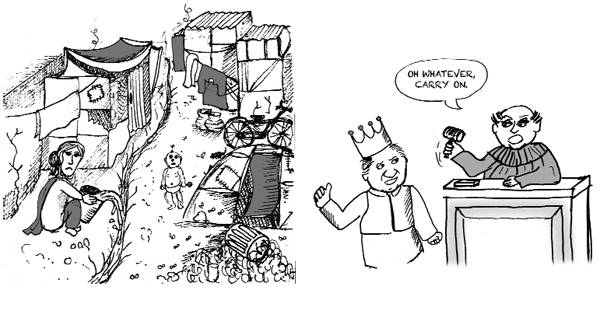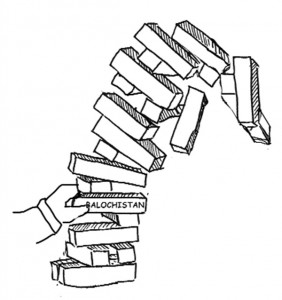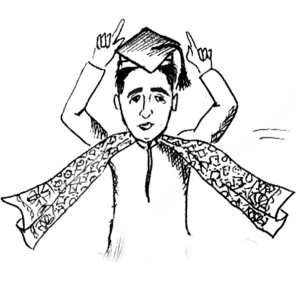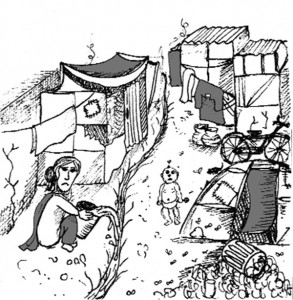
Speaking for Balochistan

Sir,
A recently published article in The Friday Times by Hashim Bin Rashid (“Why Punjab doesn’t talk about Balochistan”) has forced me to share a few thoughts, mostly contesting his conclusions, which in my opinion revolve around a single, small piece of a much larger mosaic. Mr Rashid recommends an open debate on the Balochistan issue, and this is the sole point I fully support in principle. But debate should be based on facts and clear objectives. Baseless perceptions and linguistic animosity only serve to distract from the issue.
The state and its institutions, especially the law enforcement agencies (LEAs), are failing miserably all over the country – Balochistan is no exception to this. Sindh in general and its provincial capital Karachi in particular continue to experience myriad disorders: target killings, extortion, sectarian violence and politically patronized crimes. KP has lost thousands of precious lives to terrorism. The “ever-efficient” Punjab and its “great capital” Lahore are major hubs of street crime and robbery. The “Khadim-e-Aala” regime has failed to improve the state of affairs in the southern belt where water scarcity and tribal customs have brought hell down on earth.
Terrorists move around freely: they attack the GHQ, air bases, mosques, shrines, imam bargahs, churches, Rabi-ul-Awwal and Ashura processions, and schools. Undoubtedly, the LEAs, and especially the police, have failed to perform their basic duty. Why? The simple answer is this: excessive politicization, extraordinary corruption from top to bottom, and above all, no accountability for the culprits. I would ask Mr Rashid not to view Balochistan in isolation. Being in Pakistan, people are suffering across the board – with the exception of the few ruling elite “chums” and bureaucrat babus.
Let us examine the Balochistan issue. Is it a question of governance failure or social inequality worsened by tribal customs and corruption? Or is the matter a linguistic one, i.e., Balochi vs. Punjabi? What do the Baloch demand from the state?
What the state has failed to deliver in Balochistan, it has also failed to do in most parts of the country. Mr Rashid has drawn his conclusions based on his perceptions, which generate the exaggerated impression that Punjab is either willfully silent or ignorant about Balochistan. He also claims that the army is conducting an operation in Balochistan. In my opinion, both these points are removed from the ground reality. Why raise questions only about Punjab? Balochistan suffers primarily as a result of governance failure – just like the other provinces. Why are we not talking about the “Sardars” and the ruling regime, which has persistently failed to deliver in Balochistan? Let us not convert the issue into a question of language-based inter-provincial rivalry. Why are questions not being raised about Sindh and KP with reference to the Balochistan issue? Punjab certainly speaks for Balochistan, but one needs ears and a good memory, coupled with unbiased analysis.
In January 2013, the Pakistan Institute for National Affairs organized a two-day national conference on Balochistan at the Punjab University in Lahore, under the patronage of senior journalist Altaf Hassan Qureshi. Participants from all walks of life, including politicians, members of parliament, intellectuals and hundreds of Baloch youth openly deliberated on the Balochistan crisis. Many serious issues were analyzed openly: the targeting of Hazara tribe members, kidnappings and abductions, the deterioration of the education system, attacks on foreign engineers and technicians, and foreign-sponsored insurgent elements.
In the last year, I have attended four discussion forums in Islamabad where the various dimensions of unrest in Balochistan were explored in detail. If, at a private university, students know less about “Mama Qadeer” (as Mr Rashid complains), how is this a yardstick for forming a negative opinion about a province? The lack of awareness among a few private university students about “Mama Qadeer” is no surprise to many people. If one were to ask even an uneducated cart-driver about Mr Edhi or “Gullu Butt”, he would respond positively. Personal contributions to society bring fame – or notoriety – to individuals. Mama Qadeer is apparently just a victim (like many others across the country), not a leader, and obviously an overrated figure nowadays.
Mr Rashid, let us also ask why Punjab does not speak against Balochistan even after receiving the dead bodies of innocent laborers. It is because Punjab considers this an act of terrorists operating in the garb of Baloch separatists. Punjab is not prejudiced against Balochistan, but is very realistic about “Mama Qadeer” who has just conducted “the longest Long March” with “20 or so” companions (as quoted by Mr Rashid).
The agony of Balochistan can neither be understood nor assessed without having been there. This is something I firmly believe, having been there not on a causal trip, but for well over two years. My stay helped me understand “what Balochistan really needs.” I cannot forget Jhal Jhao, a town approximately 60 km from district Awaran, where I came upon a protesting mob of mostly high school students, who had blocked the road ahead. They were demanding that a science teacher be posted immediately to the local school, given their forthcoming annual board examination. The irritation of this “forced break” on my journey turned into pleasure stirred by pain: pleasure because, in this far-flung, backward town, youngsters were protesting for their right to education; pain (which I still feel) because our youth was being deprived of a basic ingredient of education – a teacher.
Back then, in 2007, Jhal Jhao was a shantytown comprising a bazaar and a few shacks, with no electricity. The owner of the Ansari petrol pump – the sole refueling facility available on the 210-km-long Lasbela–Awaran road – revealed that, out of 22 posted teachers, only seven or eight attended the school daily. The remaining teachers regularly stayed “out and away”.
A villager resident on the outskirts of Khuzdar once told me: “We have our daily tea at breakfast without milk! Meat and milky tea are restricted to Eid day – that too, by the gracious courtesy of the village influential.” The degree college in Khuzdar, which stretches over countless acres and is located on the RCD highway, gives the look of an abandoned stable. The corridor walls are filled with political graffiti and colorful posters. Students enter the college, not to learn but for “boycotts or strikes” (along with other educational institutions here). I met many young Baloch graduates, full of ambition and energy, but unable to write even half a page correctly, whether in Urdu or English. The credit goes to the “great Baloch nationalist comrades” who do not let students be diverted from these “boycotts”. The Khuzdar Radio station director once disclosed to me that, “As young students, on the instigation of nationalist leaders, we used to protest against the construction of the RCD highway. Frontier Corps troops were deployed for the protection of engineers and laborers against angry tribal ‘sardars’ who had made threats against their lives if not paid a handsome ransom. I regret this today because the RCD highway subsequently brought a revolution to all the backward areas astride it.”
The Baloch youth need education. The people need employment, peace, prosperity and safety. The province needs its due share of good governance on a war footing. This is a great challenge for the state and for the political leadership. It is also a challenge for the media, which should not spread linguistic-based animosity wittingly or unwittingly over public suffering. The attack on Hamid Mir and the recent murder of poor Sabeen Mahmud demands deliberation before arriving at conclusions. My compliments to Najam Sethi and Muneeb Farooq for exposing Ajeet Doval’s video on Geo News, which is no less than a confessional statement of Indian state-sponsored terrorism in Pakistan. Let’s not be optimistic about India, but be practical, rational and vigilant. Mr Rashid satirically mentioned our traditional concerns about India, the US and Israel and the East Pakistan “tragedy”. These comments are too simple to analyze larger complexities.
Peace in Balochistan will bring economic prosperity and regional stability. George Friedman of Stratfor has said that Chinese economic expansion remains a constant strategic irritant for the US in this century. That a stabilized Pakistan is not acceptable to India is what I can extract from Ajeet Doval’s famous “offensive defensive” strategy. Who will Pakistan–China collaboration pinch hardest? The answer needs no deliberation. When Iran became entangled with America over the nuclear deal, its concerns about Gwadar port were visible. The Seestan issue, the attack on Iranian security guards, the Turbat massacre, the murder of Sabeen Mahmud and the link made to the ever dubious “Mama Qadeer”, the abductions, killings and missing-person cases appearing just on the Balochistan canvas all pose a threatening challenge.
The situation is worst when we look at the national sphere where the TTP, LeJ, MFU and many extremist hardcore outfits are operating. The failure of civilian quarters has thrown the entire burden on the military’s shoulders. The regional matrix is filled with the conflicting interests of the US, China, India and Iran. Positive criticism of institutions certainly leads towards improvement: the military leadership has focused significantly on terrorism. It is neither the Zia era nor the Musharraf regime.
The military establishment has apparently learned much from history. But much more is expected from the political leadership as well. East Pakistan turned into Bangladesh primarily because of its own mistakes, which were fully exploited by India. It is difficult to deny Indira Gandhi’s remarks on drowning the two-nation theory in the Bay of Bengal. I am referring to Sharmila Bose’s book Dead Reckoning, which provides a fairly unexaggerated picture of the tragedy.
Today, the nation faces many complicated challenges, regional as well as global. The weightage carried by Mama Qadeer, the cancellation of the LUMS seminar and Baloch separatists is no more than an equation spoiler. Nelson Mandela, who spent 27 years in jail without accepting any offers of asylum, won a historic victory against racial discrimination. The “ghost Baloch separatists” do not represent the Baloch. The COAS has clearly expressed his views by warning foreign elements against moving strings of terrorists in Balochistan.
The youth of Jhal Jhao demand education. The poor villagers there want employment. Those who killed the Turbat laborers, the suicide attackers and the kidnappers do not represent the Baloch. Finally, Pakistan does speak for Balochistan and Punjab is not an exception. After all, Mr Rashid expressed his views through this paper as I am doing now. The newspaper has its head office in Gulberg, Lahore – the capital of Punjab. This is a good change. Once again, I will reiterate that Punjab did not speak up against Balochistan even after receiving the laborers’ dead bodies; it considered this an act of terrorists, not of the Baloch. And Pakistan certainly speaks for Balochistan.
Sikandar Noorani,
Rawalpindi.
Car to cartel
Sir,
Local automobile manufacturers in Pakistan charge higher prices than those in most Asian countries, without offering any safety features such as air bags. It is unfortunate that successive governments, both civil and military, have failed to protect the interest of consumers by enforcing strict regulatory controls. Instead, they have protected manufacturers, who have formed cartels with the support of the bureaucracy. Members of the National Assembly appear to be disconnected from what should be their moral and constitutional obligations to protect the public interest. What can you expect from a ruling elite that prefers to use foreign limousines (fitted with safety features) bought at the taxpayer's expense - ostensibly because locally assembled cars are unsafe for them?
Malik Tariq Ali,
Malaysia.
Bilawal’s degree

Sir,
Bilawal Bhutto Zardari has just graduated from Oxford with a Master’s degree. The scion of a family known for their academic achievements, intellect and political sagacity has not disappointed – at least in terms of obtaining a quality education from a prestigious seat of learning. Although Bilawal remains politically naive, too young and under his father and aunt’s thumb for one to predict anything about his political future, it is welcome to know that we have a valuable addition to an otherwise largely ill-educated breed of politicians.
Whether he is able to reinvigorate a badly demoralised political party that was once known for its progressive and moderate stance, for being a symbol of the federation and the personification of Pakistan’s struggle for democracy has yet to be seen.
Tassawur Bosal,
Mandi Bahauddin.
Piece o’ justice

Sir,
The nexus between peace and justice enables social harmony – something that India appears to have understood. Illustrating this is the news currently making headlines across the globe: the conviction of Bollywood heartthrob Salman Khan for culpable homicide. One cannot help but appreciate the autonomy and supremacy of the Indian judiciary, which has exemplified its impartiality by deciding to punish the actor for his crime.
In fact, the Indian judiciary has, at various points, convicted as well as arrested not only Bollywood stars but also heavyweight politicians who, consumed by their lust for fame or power, had removed themselves from any thought as to the plight of ordinary citizens. In 2014, Jayaram Jayalalitha, then the Indian chief minister of Tamil Nadu, was sentenced to four years after being found guilty of having amassed wealth worth $10 million. Similarly, the Indian chief minister of Bihar, Lalu Prasad Yadav, was sentenced to five years and fined INR 2.5 million for his part in a fodder scam that surfaced after 17 years.
Drawing parallels between the Indian and Pakistani judicial systems reveals the harrowing fact that, unlike our neighbours, we have failed to evolve an efficient and effective judicial system. Instead of being driven by the principles of justice and equality, the judicial system thrives on preferential treatment: politicians are often able to bribe their way out of being penalized. Even if certain politicians are arrested, this may be on the instigation of the party holding office, which might bear a grudge against members of the opposition and have them arrested on trumped-up charges. Finally, if politicians do happen to end up incarcerated for crimes they have in effect committed, they might spend the rest of their lives boasting of the years they spent in jail without realizing that their own actions put them there.
Peace will only emerge in Pakistan if the judicial system is overhauled. While we may not always be on friendly terms with our neighbour, India, we could do worse than appreciate the autonomy of its judiciary.
Marria Qibtia Sikandar Nagra,
Lahore.
Slumdog millionaire?

Sir,
Development practitioners refer to increasing urban poverty as the “urbanization of poverty”. In several Asian countries, the numbers of the urban poor have risen dramatically over 1990–2014, due largely to the flow of migration from poor rural areas to relatively better off urban areas. As a result, slums have mushroomed across cities such as Bombay, Calcutta, Karachi, Lahore, Dhaka and Manila. Unlike rural poverty, the definition of urban poverty is more complex and extends beyond income and consumption dimensions. An important characteristic of urban poverty relates to the vulnerability of the poor based on their inadequate access to land and housing, physical infrastructure and services, livelihood sources, health and education facilities, social security networks, and voice and empowerment.
UN-HABITAT reports that Asia accounts for 60 percent of the world’s total slum population and many more yet live in slum-like conditions, in areas officially designated as “non-slums”. In much of developing Asia, urbanization has been accompanied by shelter deprivation, informality, worsening living conditions, and increasing risks associated with climate change and exclusionary urban forms. This is coupled with increasing urban inequality and stagnating consumption for lower-percentile households.
How can we control the influx from rural to urban areas? Does the world – and Asia in particular – face rampant urbanization? Will Asia become 80 percent urbanized in the next 15–20 years and, if so, will this be accompanied by growing poverty, insecurity, corruption and the failure of public service delivery? We must prepare ourselves for the challenges of urbanization and resolve the implications of rural–urban movement. The recent examples of migration to European Union countries and the horrifying death of immigrants on the open seas are not a good omen. We must act now.
Aijaz Ali Khuwaja,
Karachi.

